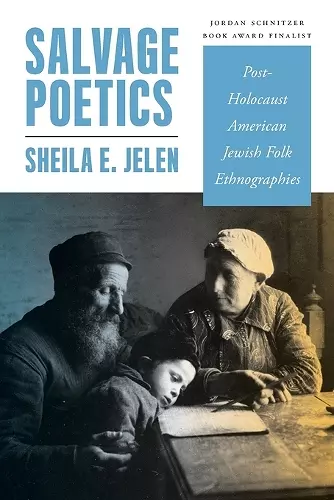Salvage Poetics
Post-Holocaust American Jewish Folk Ethnographies
Format:Paperback
Publisher:Wayne State University Press
Published:10th Oct '23
Currently unavailable, and unfortunately no date known when it will be back

This volume explores how American Jewish post-Holocaust writers, scholars, and editors adapted pre-Holocaust works, such as Yiddish fiction and documentary photography, for popular consumption by American Jews in the post-Holocaust decades. These texts, Jelen argues, served to help clarify the role of East European Jewish identity in the construction of a post-Holocaust American one. In her analysis of a variety of "hybrid" texts—those that exist on the border between ethnography and art—Jelen traces the gradual shift from verbal to visual Jewish literacy among Jewish Americans after the Holocaust.
S. Ansky's ethnographic expedition (1912–1914) and Martin Buber's adaptation and compilation of Hasidic tales (1906–1935) are presented as a means of contextualizing the role of an ethnographic consciousness in modern Jewish experience and the way in which literary adaptations and mediations create opportunities for the creation of folk ethnographic hybrid texts. Salvage Poetics looks at classical texts of the American Jewish experience in the second half of the twentieth century, such as Maurice Samuel's The World of Sholem Aleichem (1944), Abraham Joshua Heschel's The Earth Is the Lord's (1950), Elizabeth Herzog and Mark Zborowski's Life Is with People (1952), Lucy Dawidowicz's The Golden Tradition (1967), and Roman Vishniac's A Vanished World (1983), alongside other texts that consider the symbiotic relationship between pre-Holocaust aesthetic artifacts and their postwar reframings and reconsiderations.
Salvage Poetics is particularly attentive to how literary scholars deploy the notion of "ethnography" in their readings of literature in languages and/or cultures that are considered "dead" or "dying" and how their definition of an "ethnographic" literary text speaks to and enhance the scientific discipline of ethnography. This book makes a fresh contribution to the fields of American Jewish cultural and literary studies and art history.
In a series of brilliant readings of the works of photography, ethnography, and anthropology that emerged from the devastations of the Holocaust and the deracination of assimilation, Sheila Jelen uncovers the ‘salvage poetics’ that mobilized Jewish cultural fragments against the ruins. Salvage Poetics thus sheds light on both the past and present and how the two are entwined through a Jewish poetics of salvage as well as loss." - Naomi Seidman, author of The Marriage Plot, Or, How Jews Fell in Love with Love, and with Literature
"The absence felt noticeable because this stimulating and impressive book has an impact— and deserves to have a readership—far beyond its topic. While Salvage Poetics will primarily and valuably be of use for scholars examining the reconstruction of Jewish cultural life and identity after the Holocaust, it has much to say to folklorists more generally considering the interactive incorporation and adaptive use of literary material in the ongoing shaping of our own disciplinary thinking." - Paul Cowdell, Folklore
"This is a thorough academic work with a fresh approach to our understanding of pre-war Europe. It contains a number of images, beautifully reproduced in color and black-and-white. For academic collections of Jewish history and ethnography" - Beth Dwoskin, AJL News and Reviews
ISBN: 9780814350812
Dimensions: unknown
Weight: 272g
88 pages